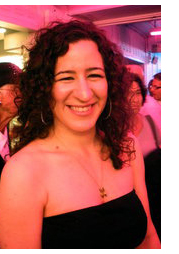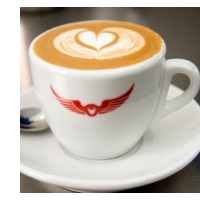| Sun | Mon | Tue | Wed | Thu | Fri | Sat |
|---|---|---|---|---|---|---|
| 1 | 2 | 3 | 4 | 5 | ||
| 6 | 7 | 8 | 9 | 10 | 11 | 12 |
| 13 | 14 | 15 | 16 | 17 | 18 | 19 |
| 20 | 21 | 22 | 23 | 24 | 25 | 26 |
| 27 | 28 | 29 | 30 | 31 |
CATEGORIES
RECENT ENTRIES
BLOG ROLL
How science can help you make a better cup of coffee
Cell biologist Stephanie Levi's Night Labs series makes science accessible.
By Ruth E. Kott, AM'07
 Molecular geneticist and cell biologist Stephanie Levi, PhD'09, wants people to understand what she does. To explain the Golgi apparatus, which she studied at Chicago, she uses a simile: it's "a structure in the cell that is like the cell’s post office," she says on her website, Science-is-Sexy.com. "The Golgi takes newly made proteins (the mail) and attaches a sugar molecule to them, which acts like a molecular zipcode that tells the cell where to send the protein."
Molecular geneticist and cell biologist Stephanie Levi, PhD'09, wants people to understand what she does. To explain the Golgi apparatus, which she studied at Chicago, she uses a simile: it's "a structure in the cell that is like the cell’s post office," she says on her website, Science-is-Sexy.com. "The Golgi takes newly made proteins (the mail) and attaches a sugar molecule to them, which acts like a molecular zipcode that tells the cell where to send the protein."
She doesn't stop at similes. To bring science to a wider population, in 2008 Levi, who coordinates Northeastern Illinois University's Student Center for Science Engagement, started Night Labs, a series of public talks about how science fits into everyday life. "Science intersects everything," she says. "I wanted people to talk across those lines and help adults who weren't scientists see science as part of their lives—and important." After leading lectures on the science of sex and attraction and on the science of extinction, in May she hosted a Night Lab on the science of coffee, which filled the second floor at Schubas Tavern in Chicago's Lakeview neighborhood. Afterward she gave an interview about what science can teach us about coffee.
Why do a Night Lab on coffee?
Night Lab is all about helping adults access science in an entertaining, enjoyable way, while highlighting science in their everyday lives. I have long been interested in doing programs on food, since in addition to being a molecular geneticist, I'm a huge foodie who takes full advantage of Chicago's rich food culture.
I don't know of anything more ubiquitous than a morning cup of joe, and I fell in love with Intelligentsia the first time I took a sip of a cappuccino from one of their retail stores. There's tons of science involved in every step of the processing, brewing, and enjoyment of coffee, and I chose to highlight those. I will be having numerous food programs in the coming years, although this was my first.

What kind of research did you do to prepare?
I had multiple meetings with the program's presenter, Sarah Kluth. Sarah is tremendous and an incredible expert on all things coffee. She is the green manager and buyer at Intelligentsia and is basically air traffic control for the company, telling them when different coffees should go to market based on their seasonality and, I'm sure, many other factors. She had a great deal of scientific expertise on coffee and brought that to our discussions.
I did quite a bit of reading just out of my own interest, and, of course, being a scientist, I know the chemistry, physics, and biology that underlie all of it, but did not specifically know the information that pertained to coffee. One of the fun parts of doing Night Labs is that I get to learn about various aspects of science and continually make new discoveries about fields I would otherwise know nothing about, and offer a stage to scientists and other thinkers to share their work and ideas with the broader public.
What do you look for in a cup of coffee? What do you usually drink?
Honestly, a cappuccino at Intelligentsia is my ideal—it's creamy, mellow, tastes like caramel and chocolate; it is such a treat. The milk is perfect; the temperature is perfect. It's a Saturday treat for me.
How do you make coffee at home?
I have always used one of those Italian stove-top coffeemakers—you put water in the bottom, coffee in a metal filter right above that, and put it on the stove, and it percolates to a chamber in the top, which you then pour into your cup. I also have a French press and use that mainly at work. I'm switching to an automatic coffee maker, however, which, I learned from Sarah, gives the coffee preparer (me) less control.
What did you learn from Kluth's talk? Will it change the way you make coffee?
After the Night Lab event, I'm switching one of those gold filters instead of paper—the molecules that give coffee its aroma and complexity can stick to a paper filter. I now want to go out and get a burr grinder as well; it provides a uniform grind to the coffee beans, unlike an electric grinder, and I learned from Sarah that you really want a uniform grind to your coffee so that the surface area of each grain of coffee is even, and the extraction of coffee into your water is even, giving a good-tasting cup.
I also use purified water, not distilled or tap. Distilled has no minerals to attach to the molecules that give coffee a great flavor, so you wind up with a really weak-tasting, flat cup of coffee if you use it. Tap is loaded with chlorine, which gives you an off-tasting cup. Ideally, the temperature of coffee needs to be pretty precise too—Sarah shared with us that the ideal range of extracting a cup of coffee is about 195–205 degrees F (the boiling point of water is 212 degrees).
[Finally] I will never, ever put coffee in the fridge as a way of keeping it. I will try to use my coffee within two weeks of buying it. Sarah gave guests of the Night Lab program a half pound of coffee, and it had been roasted two days prior.
July 25, 2011
